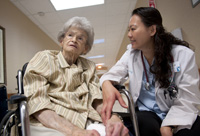Editorial
Front Page - Friday, February 18, 2011
Hospice of Chattanooga providing soothing end-of-life care
David Laprad
 Hospice of Chattanooga is a leading hospice provider in Southeast Tenn-essee and Northwest Georgia.? The not-for-profit organization believes in family-focused care that treats the physical, emotional and spiritual needs of its patients and their loved ones at the end of life.? Here, Dr. Julian Haun visits with a patient.
- Photo provided
Hospice of Chattanooga is a leading hospice provider in Southeast Tenn-essee and Northwest Georgia.? The not-for-profit organization believes in family-focused care that treats the physical, emotional and spiritual needs of its patients and their loved ones at the end of life.? Here, Dr. Julian Haun visits with a patient.
- Photo provided
As a hospital administrator, Hospice of Chattanooga CEO Rev. Clark Taylor Jr., had seen more than his share of bad deaths, where the patient had “tubes coming out of every orifice God gave him and some the medical staff had created along the way,” so he became a believer in the hospice alternative. But there are still a lot of misconceptions among the public about palliative care. In an attempt to purge the mistaken beliefs, Taylor spends his days educating people about hospice.
“Hospice is quality, compassionate care for people facing life-limiting illnesses. A lot of people think hospice simply helps you die, but that’s not the case. There’s expert medical care, pain management, and emotional and spiritual support,” he says.
Taylor says one of the myths about hospice is that its nurses are “angels” who hasten the end of life. To counter this fallacy, he cites statistics from a national study that suggests hospice patients live about a month longer than terminally ill people who are not experiencing that level of care.
Another false impression is that hospice is for the very end of a person’s life, despite the fact that Medicare covers hospice for a minimum of six months. The average length of service is 69 days, with half of those people spending 21 days or less in palliative care. Taylor urges patients and caregivers to seek help sooner rather than later in order to improve the quality of the sick person’s life for as long as possible.
Many people would ask for help sooner if they realized they were allowed to request an evaluation, Taylor says. However, most people erroneously believe they must wait for their physician to recommend hospice.
“You can request an evaluation, and someone will assess your situation for free,” he says.
Hospice of Chattanooga is a not-for-profit organization that annually cares for about 2,500 patients in 18 counties. On any given day, the association will have between 450 and 550 patients in its care, whether at home, in a hospital or the group’s in-patient residential facility at NHC. About 70 percent of Hospice of Chattanooga’s patients live at home.
The organization provides each patient and his or her caregivers a complete package of services that includes board certified physicians, nurses, nurse’s assistants, social workers, chaplains, bereavement counselors and trained volunteers.
Hospice of Chattanooga employs 10 full-time physicians. In addition, the organization’s nurses are either nationally certified or are
working toward their certification. And the association’s social workers connect patients and caregivers with services in the community that can provide additional assistance, such as with a financial need.
“Maybe there’s a child living across the country. The social worker will keep him informed. And maybe a sibling living locally is feeling resentment toward his or her brother or sister. The social worker can address those issues,” says Rachel Withers, public relations coordinator at Hospice of Chattanooga.
And, in accordance with
Medicare, Hospice of Chatta-nooga has a trained volunteer force that can relieve caregivers for a short period or run errands.
“We have a huge volunteer program. Our volunteers are important because our caregivers grow tired and might need an extra set of hands to wash linens,” Withers says.
Hospice is a relative new-comer to the health care industry. The movement has its roots in the work of British physician Cicely Saunders, who began working with dying patients in the 1940s and founded the first modern hospice in London, England. A dying patient who asked Saunders for “words of comfort and acts of kindness and friendship” inspired her work.
The first hospice in the U.S., the Connecticut – Hospice, opened in 1974. A short time later, an in-patient hospice at Yale Medical Center and a hospice program in Marion County, Calif., appeared. Hospice of Chattanooga opened in 1981. In 2009, more than one million of the 2.5 million people who died in the U.S. received palliative care through one of the 3,500 hospices in the country.
As the testimonials on the Hospice of Chattanooga Web site at www.hospiceofchattanooga.org show, the services the organization provide are invaluable to its patients and families.
“Hospice of Chattanooga was our stability during a critical time following the death of our baby son. We didn’t know where to turn until we began bereavement counseling,” the site quotes the members of one family as saying.
Taylor says the staff at Hospice at Chattanooga considers what they do their mission, not their job.
“Just like some nurses are called to do perinatal work, our workers say this is what God has called them to do.”
|
|